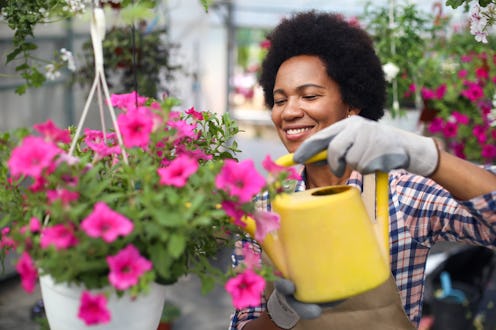
Aishwarya, a 31-year-old plant parent to more than 35 pots of herbs and veggies, says gardening helped give her a purpose during the pandemic. “It’s been a form of self-care,” she tells Bustle. “When I wasn't able to do much other than my office work and chores, [planting] was the form of recreation that motivated me to get up and get going.”
If you count your herb garden or cluster of windowsill succulents as family, then you already partake in the latest trend in wellness: gardening. While face masks and baths are often what come to mind when you think of self-care, more and more millennials are turning to seedlings as a way to unwind and feel good — especially during a time of heightened stress from COVID and being in quarantine. Data from the National Gardening Association’s (NGA) 2019 National Gardening Survey found that the age group was responsible for a quarter of all money spent on gardening in 2018 (a $52 billion dollar industry, BTW), despite having less wealth than older generations. And there’s a reason for that: Plants can actually have that healing effect the generation seeks.
The main appeal of keeping greenery around? Darryl Cheng, creator of House Plant Journal and author of The New Plant Parent, says gardening feeds the soul. He sums it up in what he calls the ABCs of plant appreciation: ‘A’ for aesthetics; ‘B’ for biology, since people are fascinated by how they grow, propagate, and survive; and ‘C’ for companionship. “When you have a plant for a long enough time you develop a real connection, just the same as with your dog or cat,” he tells Bustle.
Gardening several times a week was associated with higher levels of perceived wellbeing, less stress, and more physical activity.
These factors particularly resonate with millennials given the circumstances of their coming of age, says licensed counselor Nawal Alomari, LCPC. Most millennials’ adulthood has thus far been defined by an economic recession, a global pandemic, political dissent, and/or having the fastest-growing debt compared to those who came before them. As a result? This generation is a more anxious and overworked group, Alomari explains, and plants provide a sense of control and achievement. “Our generation, unfortunately, doesn't get to see much fruit of our labor,” she says. “We need that sense of accomplishment.”
Millennials are also waiting longer to have kids — if they decide to have them at all — compared to older generations. For many, plants have temporarily (or completely) fulfilled that desire to nurture without the time or money cost of raising a child, says Alomari — hence the term “plant parent.”
Cheng says they’re also using gardening as a way to connect with nature, especially in urban settings where it may be difficult to access fresh food or the great outdoors. “I live downtown, so it's concrete jungle all around me,” he explains. “When you see plants, it signals to you that the space is conducive to life — it’s like having a piece of the outside with you.”
There’s science to show that gardening actually helps you unwind. A 2020 study published in the journal Landscape and Urban Planning found that gardening supports high emotional wellbeing, including feelings of happiness and meaningfulness. And a 2021 survey of about 6,000 people found that gardening several times a week was associated with higher levels of perceived wellbeing, less stress, and more physical activity.
“When you see plants, it signals to you that the space is conducive to life.”
How can watering some cacti do all that? Alomari says it can take you out of your anxiety and into the moment, acting as a form of mindfulness. Kendall, 35, took up gardening by chance when she moved into a new home and the yard needed some sprucing up. “It’s a form of active rest that keeps the brain just occupied enough so it doesn't wander from the activity you’re doing, but not so much that it becomes stressed,” she tells Bustle. “It has given me a sense of agency.” Since then, she’s come to love the meditative effects of planting so much that she became a mindful gardening coach.
It’s these stress-soothing effects that make gardening such an effective wellness practice, says Alomari. Where self-care favorites like a long soak in the bath or sipping on a glass of rosé may fall short on cultivating emotional wellbeing in the longer term, the process of tending to a garden can provide that sense of stability, control, and pride needed in anxious times. The satisfaction you feel when a flower sprouts doesn’t hurt, either.
Studies referenced:
Ambrose, G. (2020). Is gardening associated with greater happiness of urban residents? A multi-activity, dynamic assessment in the Twin-Cities region, USA. Landscape and Urban Planning, https://www.sciencedirect.com/science/article/pii/S0169204619307297?via%3Dihub
Chalmin-Pui, L. (2021). Why garden? – Attitudes and the perceived health benefits of home gardening. Cities, https://www.sciencedirect.com/science/article/pii/S0264275121000160
McGinnis, E. (2020). Enhancing Consumer Horticulture’s Millennial Outreach: Social Media, Retail, and Public Garden Perspectives. American Society for Horticultural Science, https://journals.ashs.org/horttech/view/journals/horttech/30/6/article-p642.xml
Experts:
Nawal Alomari, LCPC, a licensed clinical professional counselor and life coach based in Chicago
Darryl Cheng, creator of House Plant Journal and author of The New Plant Parent